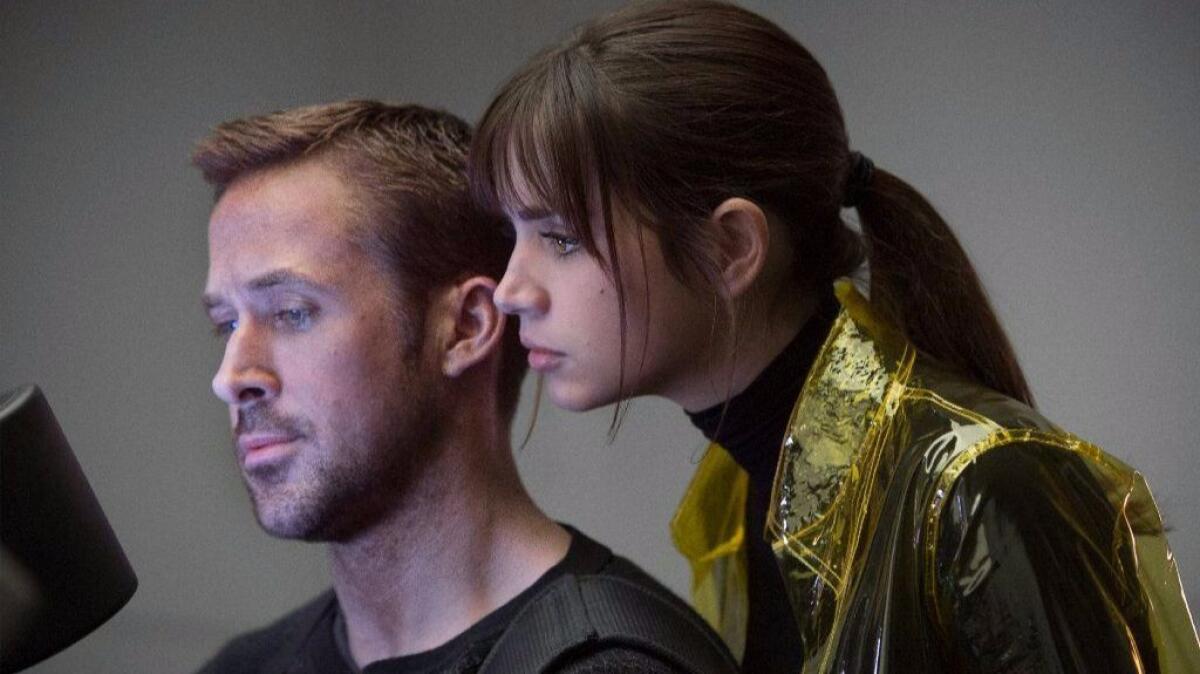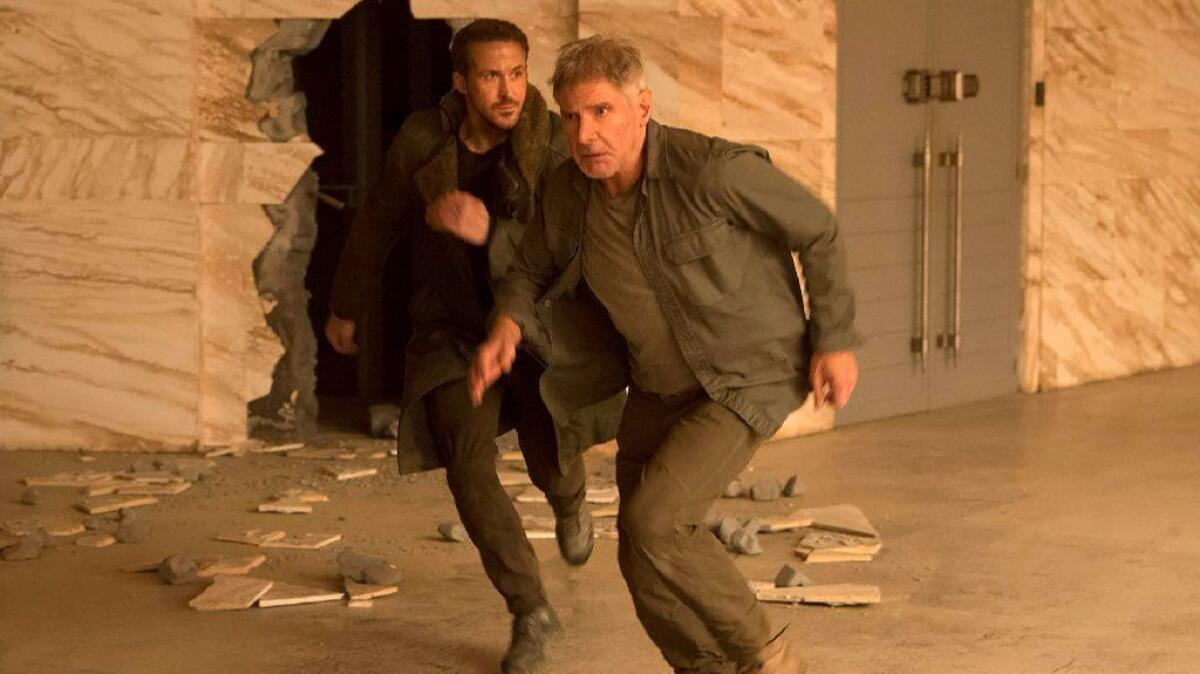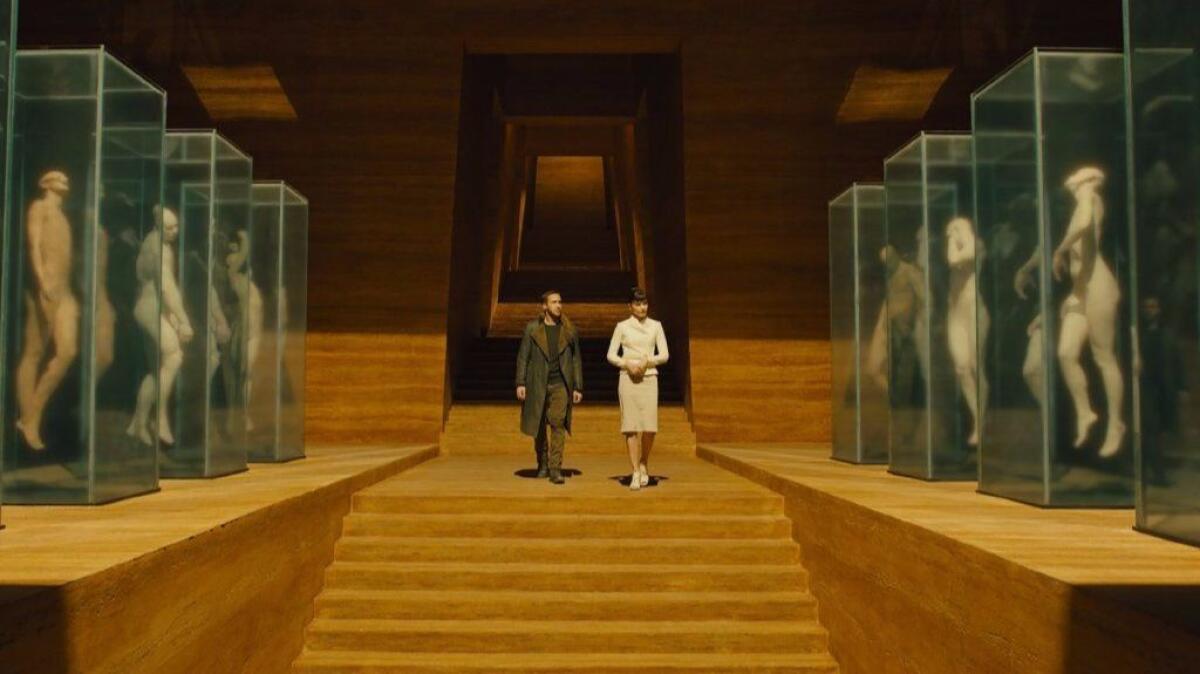Is Deckard a replicant? āBlade Runner 2049ā writers discuss that and other mysteries
After months of being shrouded in secrecy, the long-awaited dystopian sci-fi sequel āBlade Runner 2049ā finally hit theaters Friday, and though the opening weekend numbers may have been underwhelming, those who have seen the film have found plenty to chew on.
Critics have almost universally embraced director Denis Villeneuveās film ā which stars
Fittingly, it seems a film centered on androids known as replicants could end up replicating the path of Ridley Scottās original 1982 classic. Based on Philip K. Dickās novel āDo Androids Dream of Electric Sheep?ā that film was deemed a box office disappointment in its initial release but went on to develop a deeply passionate fan base.
The Times spoke with original āBlade Runnerā co-writer Hampton Fancher and his ā2049ā co-writer Michael Green about how the script for the new film came together, the oft-debated question of whether Deckard is a replicant and where the franchise could go from here.
Warning: Major spoilers about āBlade Runner 2049ā ahead. Proceed at your own risk.
Hampton, what went through your head when you first got the call from Ridley that he wanted to talk about a sequel to āBlade Runnerā?
Fancher: A collision of joy and suicide. I was very excited but very fraught because I had one little idea and thatās not even a fig leaf. You canāt go out in public with that. Then I got a couple of little ideas and three little ideas and then we were off to the races. But it was frightening.
What was that first little idea? Was it the notion that Rachel and Deckard could have had a baby together?
Fancher: It was just the character of K. I had written a little āBlade Runnerā short story about a new kind of blade runner and I named him Kard, with a K. So there was this character who could be investigating something and that could maybe be a through-line [for the sequel]. There was also a romance with a digital woman. So there were certain ingredients, some flavors.
I read Ridley a paragraph from the story on the phone and he said, āCome on over to London and letās talk.ā On the way to London, I was desperate to think of something and I thought, āWhat about a genesis idea?ā Then it started developing as we confabulated for a week. I did a treatment and, from the treatment, I did a first draft ā and then I was gone. Then Michael confabulated much longer and more fruitfully.
The image was this: A handbook turns into a poem through his experiences and his ordeal and love.
ā Hampton Fancher on his inspirations for Ryan Gosling's character, K

Michael, how did you come onboard the project?
Green: I was led into the very comfortable and stylish offices at [Scottās production company] Scott Free and given Hamptonās treatment to read, which as a fan I was excited to do. Like a lot of people, I was nervous about it: Do you really want to rattle the hornetās nest of āBlade Runnerā and open up that legacy? But from the first lines, I could see that there was a tone and a world that I wanted to spend more time in.
There were some ideas in there that were viral and sticky: this idea Hampton had of a new kind of blade runner and the idea of a digital girlfriend. And the idea of the potential of a child ā that spoke to me of a moment of speciation and that opened up themes that were very interesting and avenues of story.
Did you plan from the outset for the prospect of Harrison Ford returning to play Deckard?
Fancher: That idea was there from the beginning. At first, I thought, āWhat if he doesnāt want to do it or he dies or whatever ā is the movie over?ā Then I realized, āNo, this is Hollywood ā youāll have another actor as good as him play old Deckard.ā But it was written with him in mind.
Green: I knew that this story that I was building out from what Hampton built himself was going to require none other than Harrison Ford, that without him you couldnāt do that story. If he said, āNo, thank you,ā maybe we could start from scratch and come up with something else. But that was a lottery ticket I was happy to buy. I remember very specifically getting that call that we didnāt have to throw it out. That he did like it and was interested.
Fancher: Yeah, that was a great moment.
āBlade Runnerā fans have debated for decades whether Deckard is a replicant. In this movie, itās revealed right away that Ryan Goslingās LAPD officer, K, is a replicant. What was the thinking behind making that character an android?
Fancher: I just thought itās a reflection of the world. Automation breeds automation. The image I had in my head of K, as I wrote in that first little short story, was that this guy is a handbook. He follows the rules. Heās a machine in a way. But the image was this: A handbook turns into a poem through his experiences and his ordeal and love. And the same thing with the digital woman.
The debate seems to continue, and people seem to think that those who think the opposite of them are nuts.
ā Michael Green on whether or not Deckard is a replicant

As I see it, this movie seems to suggest that Deckard is a human, not a replicant. But there are other people who interpret it differently.
Green: One of my favorite outcomes from the film from early reactions Iām seeing is that people are coming out of it even more sure of the opinion that theyāve held ā and still not agreeing. That gives me tremendous joy. And that includes some of the people that were responsible for the original film and this film. The debate seems to continue, and people seem to think that those who think the opposite of them are nuts.
Fancher: Iāve always thought that if the replicant-cy is a success, then you donāt know that youāre a replicant. So either way youāre ā¦ in terms of the ambiguity of it ā and life is ambiguous.
Deeming Deckard a replicant closes the door on the party: āGo home, everybody, itās closed.ā Itās got to be up in the air or thereās no dog fight. Itās an aesthetic philosophical equation. Like, Iām not so sure Michael Green is an authentic human being. You know what I mean?
Green: I agree. I donāt think this movie answers definitively one way or the other, but Iām tickled that many people do and Iām also tickled that many people donāt. Some people come out saying, āThank you for not answering itā and other people come out saying, āThank you for answering it.ā And thatās what we set out to do. We wanted to make sure that the ambiguity is built into the story.
āBlade Runnerā is all about questions of authenticity, comfort with ambiguity, and you canāt discuss the film without talking about that particular ambiguity ā is he a human or a replicant? ā or even about which version of the film is the authentic version of the film. So the film itself is representative of gradations of realness.
Which is all in the spirit of Philip K. Dick.
Fancher: I wouldnāt know about that. Have you read any Philip K. Dick? I havenāt.
Really, you havenāt?
Fancher: No. I mean, I read that novel [āDo Androids Dream of Electric Sheep?ā] a couple of times. But Iāve never been a lover of Dick.
Green: [laughs] Thereās your pull quote!

This is a movie thatās pretty dense with philosophical musings and mysteries. How did you set about balancing that with the need to deliver the kind of action an audience for a big-budget movie expects?
Green: There was a very clear recognition from everyone involved that this was āBlade Runner,ā that no one wanted to turn this into āTransformers.ā We werenāt just trying to bang pots and pans.
There were definitely points where people were looking at the script as a whole and wondering if the heart rate had gone down for too long. But once I started the process of re-crafting some of those moments with Denis, everything snapped into focus. If he tells me that a moment has enough tension or impact, I believe him ā I donāt think Iāve had as long a sustained cardio workout as I did seeing films like āSicarioā and āIncendies.ā So you start shaping it specifically to suit his vision.
Ridley Scott has talked about potentially building out the āBlade Runnerā universe in the way the āAlienā universe has expanded. Have you two considered the possibility of future āBlade Runnerā movies?
Green: Iāve certainly fantasized about it but I kept it in the box of fantasy until we had this movie well in hand and knew that it landed well. At no point during the making of this were people concerned with building out the universe. All the focus was on: āLetās make the best possible movie we can right now and then maybe, maybe dare to dream.ā Iām sure Hampton already has ideas, though.
Fancher: Well, I didnāt before but I do now ā because of your ending. In my script, Deckard died at the end, but you have him live.
The first time Ridley and I ever considered doing a second āBlade Runner,ā in 1986 or whatever it was, I came up with an idea about Deckard and his next job ā and itās kind of horrifying what happens in my little fantasy.
Now that Deckard lives, that idea is back in my head. But Iām not going to tell you what it is.
Twitter: @joshrottenberg
ALSO
Review: 'Blade Runner 2049' delivers a visually dazzling follow-up 35 years after the original
Only good movies
Get the Indie Focus newsletter, Mark Olsen's weekly guide to the world of cinema.
You may occasionally receive promotional content from the Los Angeles Times.








